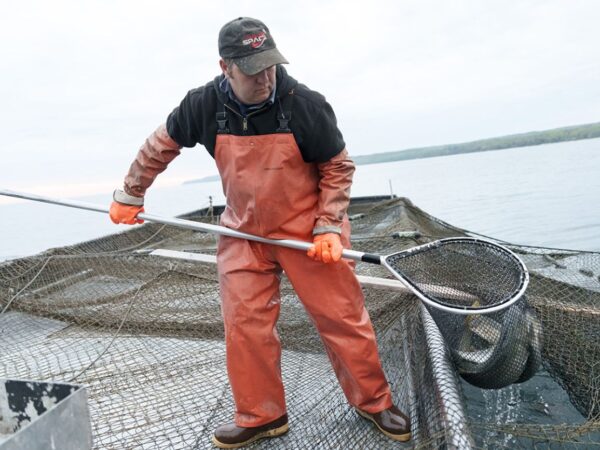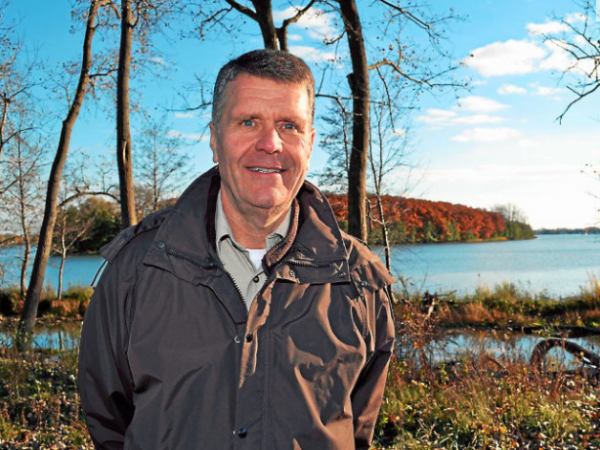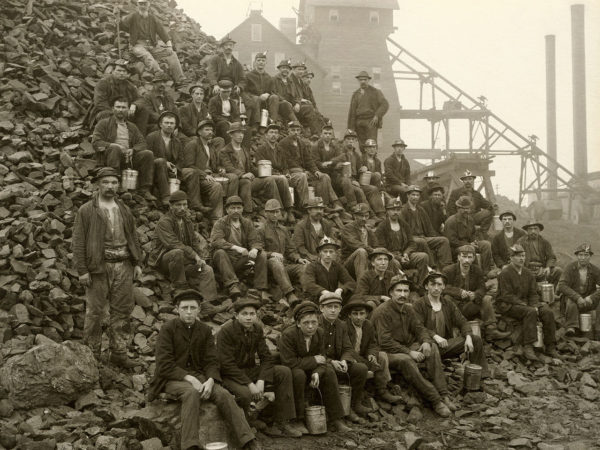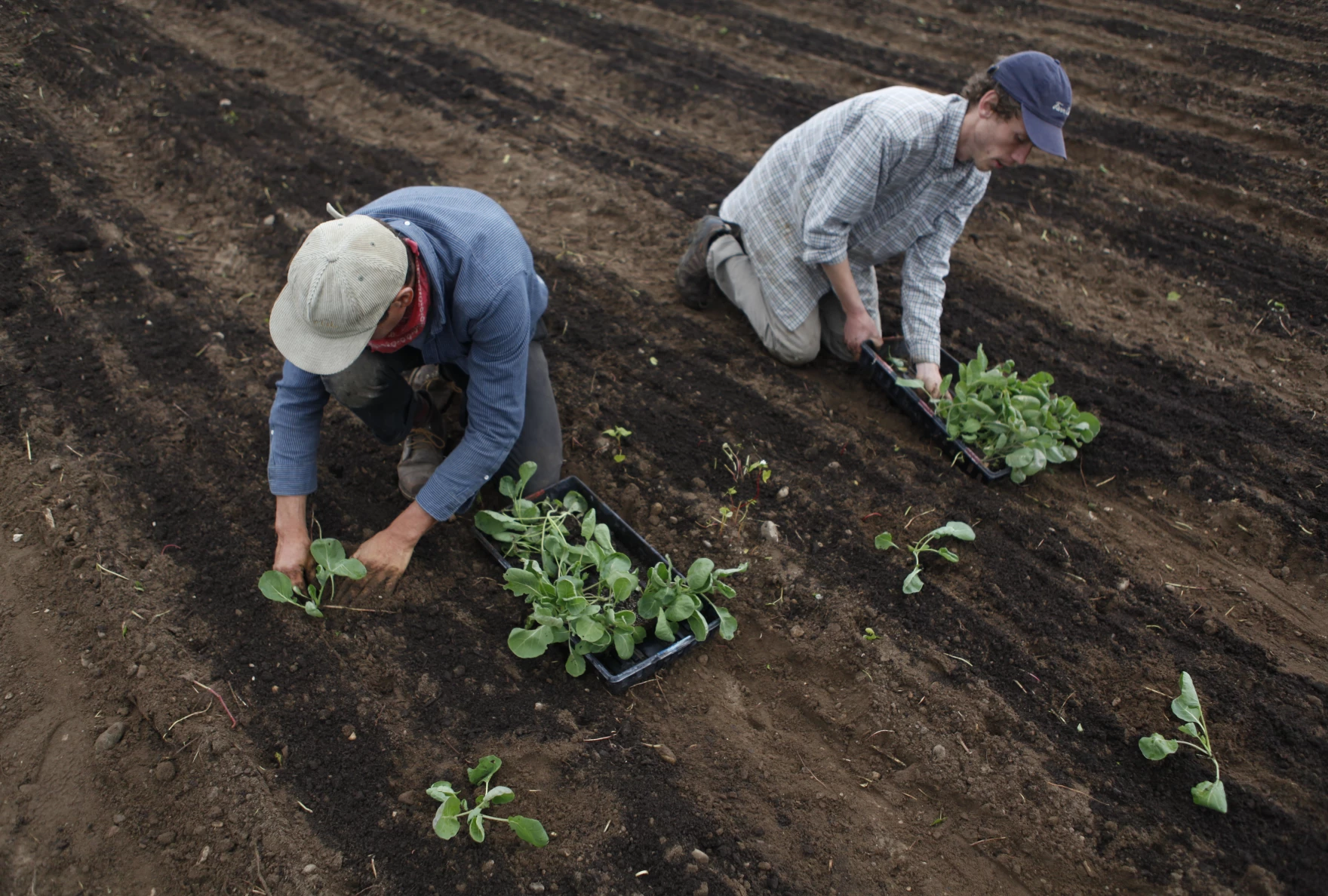
By Morgan Springer
Points North is a biweekly podcast about the land, water and inhabitants of the Great Lakes.
This episode was shared here with permission from Interlochen Public Radio.
Growing up, Nic Theisen thought farming was a terrible way to make a living. Still, at the end of college, he was won over while working a fall harvest on a farm. He’s been farming ever since.
Nic’s childhood opinion wasn’t totally wrong. He and his wife, Sara, have operated Loma Farm in Traverse City Michigan for the past fifteen years, growing vegetables and flowers. But it’s hard. After spending day after day on their hands and knees in the dirt, they hardly make a profit from the farm.
“I call this whole project a labor of mixed emotions,” Theisen says. “It’s not a labor of love. Sometimes it is a labor of absolute disgust. I cannot stand it. It is so hard, and I feel so downtrodden. Other times I’m just floating through the beauty and the luck of it all.”
This is a story about working really, really hard and still not knowing if you’re going to make it. Until something big changes.
Credits:
Producer: Morgan Springer
Host / Editor: Dan Wanschura
Additional Editing: Michael Livingston, Peter Payette, Ellie Katz
DAN WANSCHURA, HOST: Nic Theisen is on his hands and knees in the dirt planting brussels sprouts.
NIC THEISEN: It’s like movement without thought.
(sound of planting brussels sprouts)
WANSCHURA: Nic and his wife have a farm in northern Michigan. They grow vegetables with the help of a bunch of farm workers. Still sometimes Nic will work 16-hour days, barely taking a break to eat, except maybe when he grabs a carrot or a cucumber from the garden or some bread and cheese.
And after all that crawling around on his hands and knees in the dirt, he hardly makes a profit from the farm. Nic says it’s an experience that’s full of contradictions for him.
THEISEN: I call this whole project a labor of mixed emotions, you know. It’s not a labor of love. Sometimes it is a labor of absolute disgust. I cannot stand it. It is so hard, and I feel so downtrodden. Other times I’m just floating through the beauty and the luck of it all. Like, this is just– how is this happening?
(sounds of the farm)
WANSCHURA: This is Points North, a podcast about the land, water and inhabitants of the Great Lakes. I’m Dan Wanschura.
This is a story about working really, really hard at something and still not knowing if you’re going to make it. Until something big changes.
Producer Morgan Springer picks up the story right after this.
(sponsorship message)
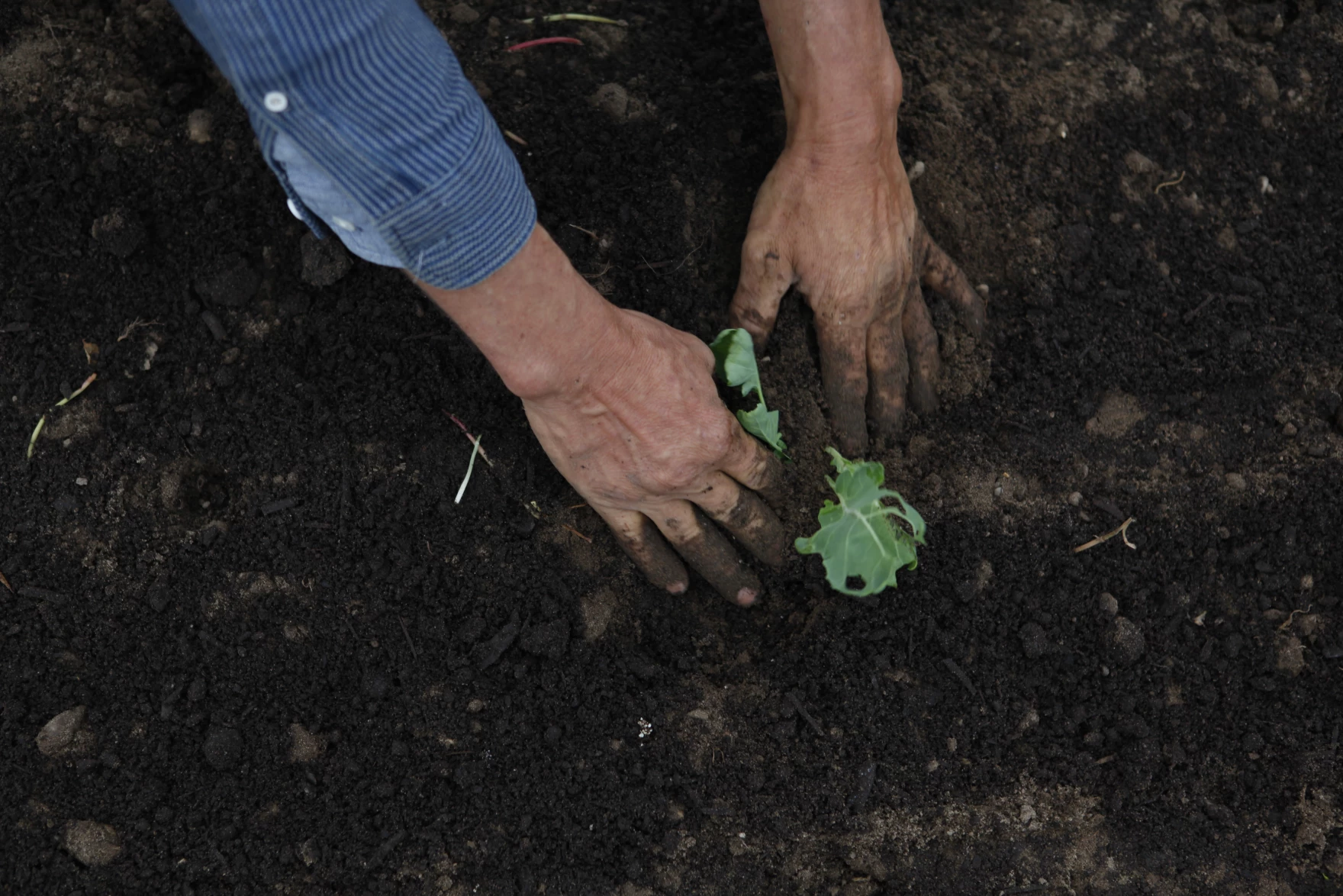
Nic Theisen planting brussels sprouts. (credit: Dan Wanschura/Points North)
THEISEN: One row, two foot spacing, every other dibble.
(Sound of planting brussels sprouts)
THEISEN: The tendency is to really spend a lot of time pampering – like tucking and patting. Just like these plants want to live, they’re gonna live.
(sound of planting brussels)
MORGAN SPRINGER, REPORTER: So, tell me a little bit about, um, growing up, and did you, did you think about farming?
THEISEN: Well, I thought about farming, and I thought it was terrible. It’s true. My dad is– I’m just one generation removed from dairy farming. My dad grew up on a dairy farm in southeastern Wisconsin. … I just saw farming as a terrible way to make a living, honestly. I can remember my grandma saying, ‘You know, Nic, farming is not a bad way to live. You’re your own boss. You get to raise your own food. You get to live in the country.’ And I just didn’t see it.
SPRINGER: Was your grandmother, right?
THEISEN: Yeah, without a doubt. It’s funny, I sometimes wonder is there– do we have ancestral memory or is there something in us that is deeper than our upbringing. For example, like is farming in my heritage? Because it’s many generations deep back to Europe, and I don’t know the answer to that, but I feel very natural.
(sounds of the farm)
SPRINGER: Nic went from thinking farming was terrible to actually farming after college. Fifteen years ago, he and his wife Sara started Loma Farm. It’s in Traverse City, Michigan.
(sounds of farm work)
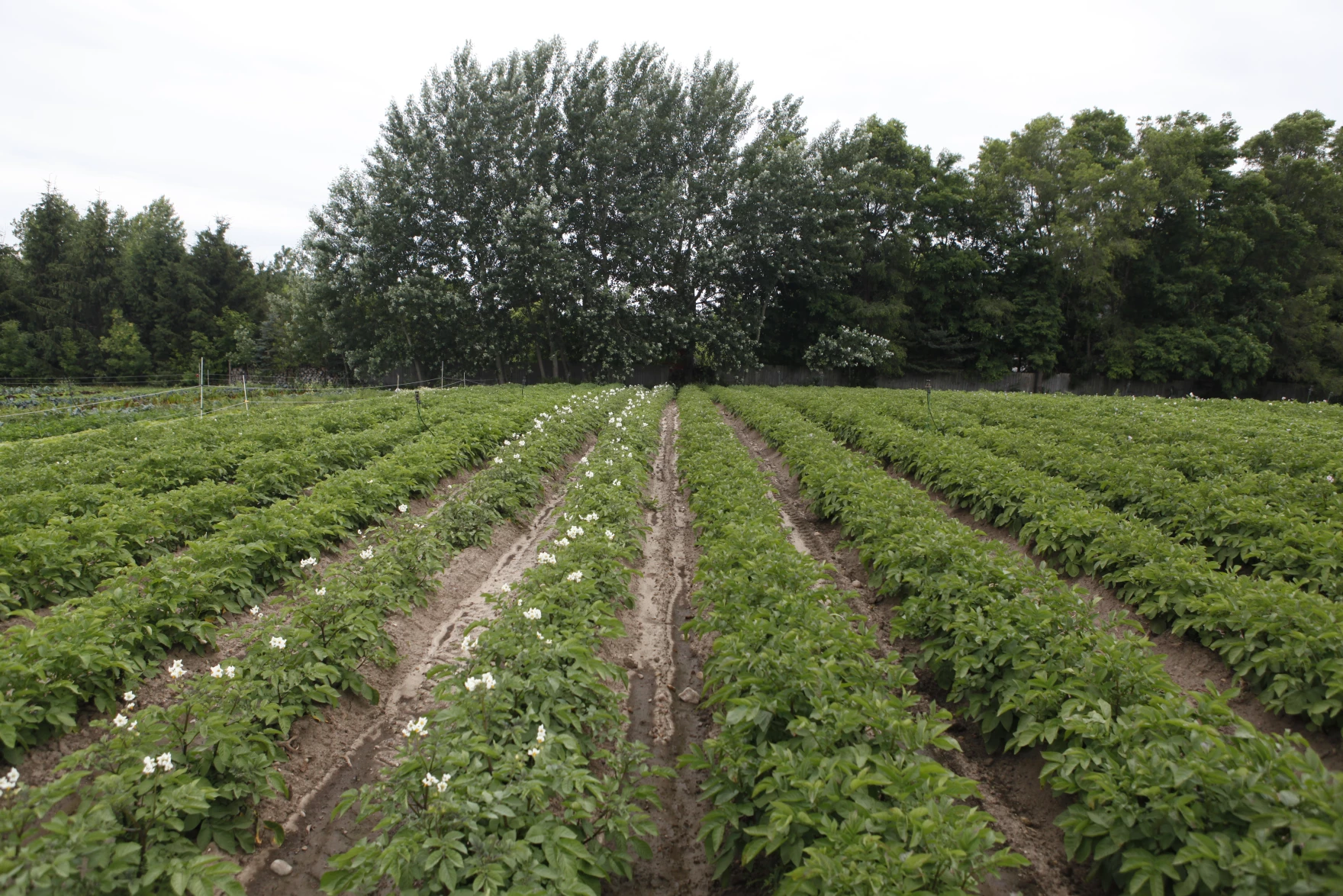
Loma Farm grows vegetables on about seven acres of land in Leelanau County, Michigan. (credit: Dan Wanschura/Points North)
Today at Loma, the sun is muted by clouds, and there’s a light breeze. Farm workers are spread out across about seven acres of land, planting carrots, cutting pea shoots, spreading compost.
(sounds of farm work)
The farm’s in a pretty ideal location. The region around Traverse City, Michigan is a huge tourist spot. And there’s a thriving restaurant scene with lots of chefs using locally sourced food. Really if any small farm could make it, this seems like a good spot.
Nic says they started small and slowly scaled up.
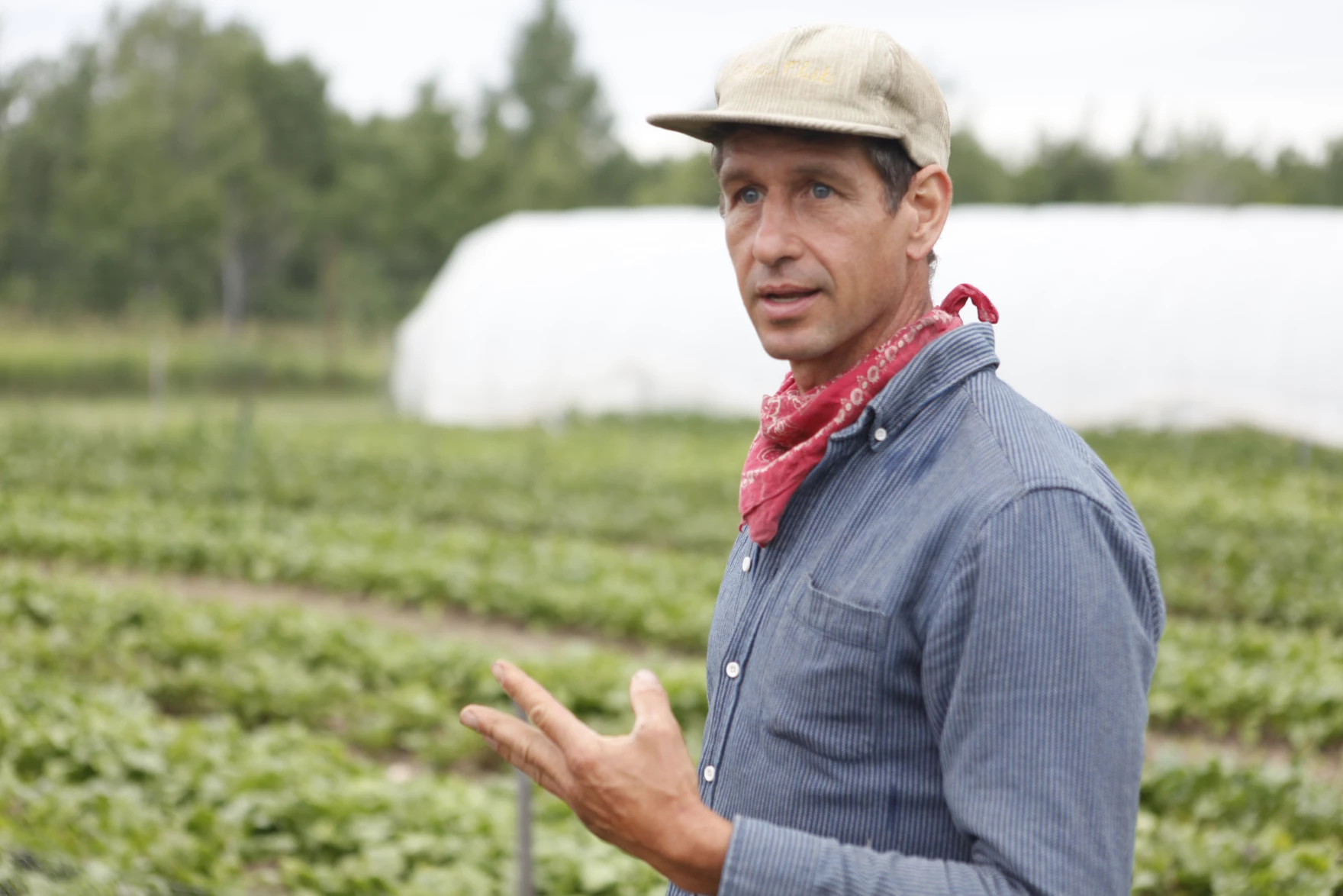
Nic Theisen, started Loma farm with his wife, Sara, in 2010. (credit: Dan Wanschura/Points North)
SPRINGER: In those first few years, what was your feeling? Was it like, yeah, this is great. We’ve got it going.
THEISEN: No. … We had one foot out the door is the honest truth. And we resigned ourselves to the notion that if this project didn’t work, it was our last effort at farming and that we would find different professions. … I was exhausted, very underpaid, very overworked.
SPRINGER: On top of that, there aren’t any guarantees that you’ll even get a harvest. And there’s ONE moment that really put the risk of farming into perspective for Nic. It happened before Loma Farm – back when he and his wife were farming in Colorado. It was late June, and the fields were full of vegetables.
THEISEN: And we had a six-inch hail storm. So hail on the ground, flowing down the road into the culverts, and it destroyed every single crop in the field. There wasn’t a crop left. Nothing, you know, our full livelihood destroyed. And still, to this day, if I hear thunder in the night or lightning, I’m instantly up, and I’m instantly in panic mode. And I think that it honestly is– it’s triggering. It’s triggering a traumatic episode of extreme loss. And It’s the first time that I realized how very vulnerable humans are.
SPRINGER: Nic’s struggle is not unique. Farming is hard and numbers bear that truth. The number of farms has declined a ton in the U.S. At its peak in 1935, there were 6.8 million farms. Now it’s less than 2 million. That info’s from the U.S. Department of Agriculture.
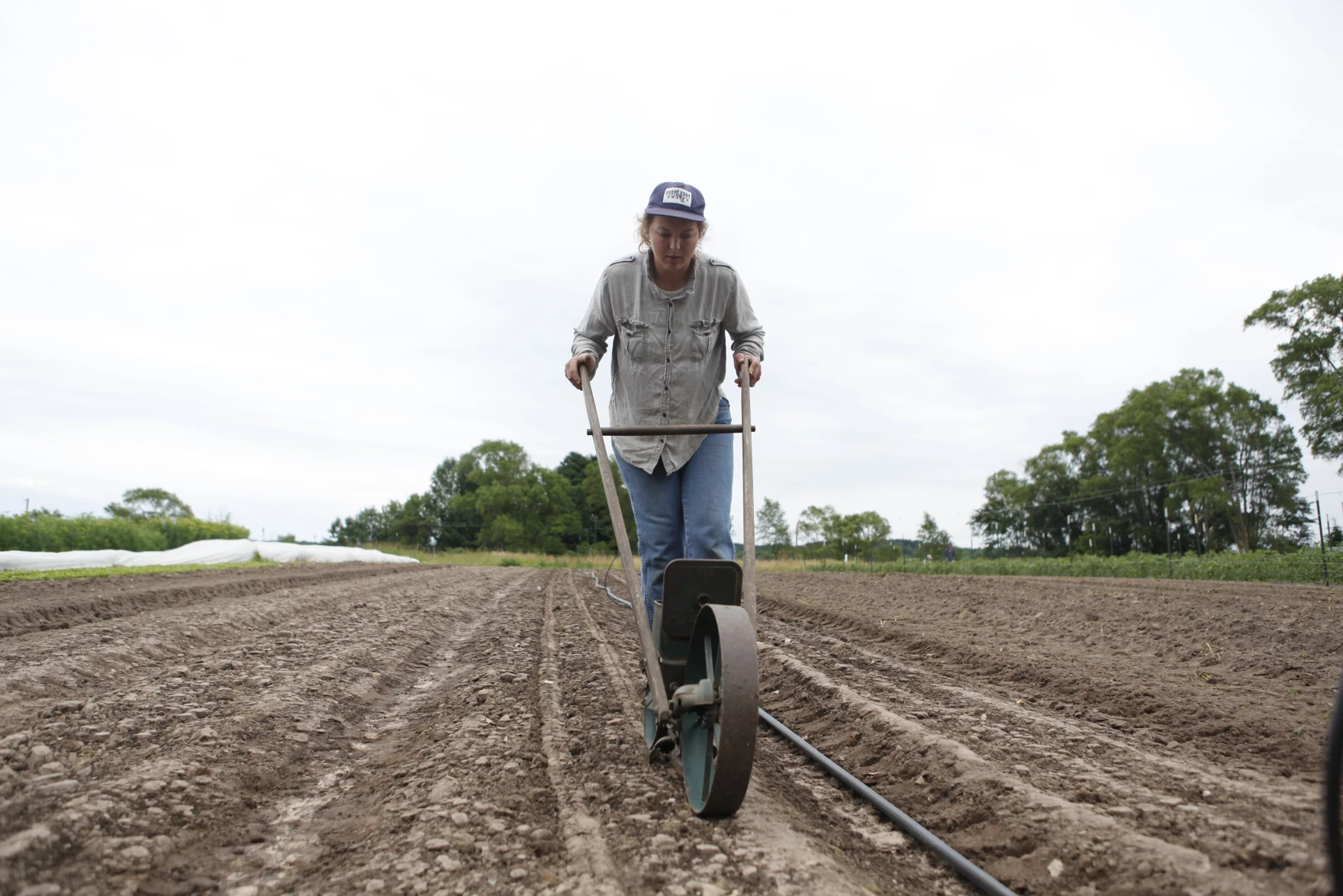
Farm worker Lexi Kuznar plants carrots at Loma Farm. (credit: Dan Wanschura/Points North)
SPRINGER: Why do you think you’ve survived?
THEISEN: Frugality, I think is the first reason we survived.
SPRINGER: Nic says their personal expenses are small. They drive old vehicles. They live in a 700-square-foot apartment in a pole barn. They eat a lot of the food they grow. He says they haven’t really needed much money to make it.
THEISEIN: I would never want to paint our life as destitute or in want of anything because we weren’t. I mean we were– these are choices, you know, we’re privileged people. We have college degrees and supportive families. And … it’s a hard way to make a little bit of money. And so frugality was number one and then tenacity and just real extreme stubbornism. I mean really, really, really stubborn.
SPRINGER: You are?
THEISEN: Yes! Yeah, like I am going to win, you know, it’s like I’m fighting nothing. Like this invisible force that makes it hard to make a living farming, and I am going to succeed. … And I wanted to do it. I love food. I love land. I love this interaction. I just wanted to be more comfortable.
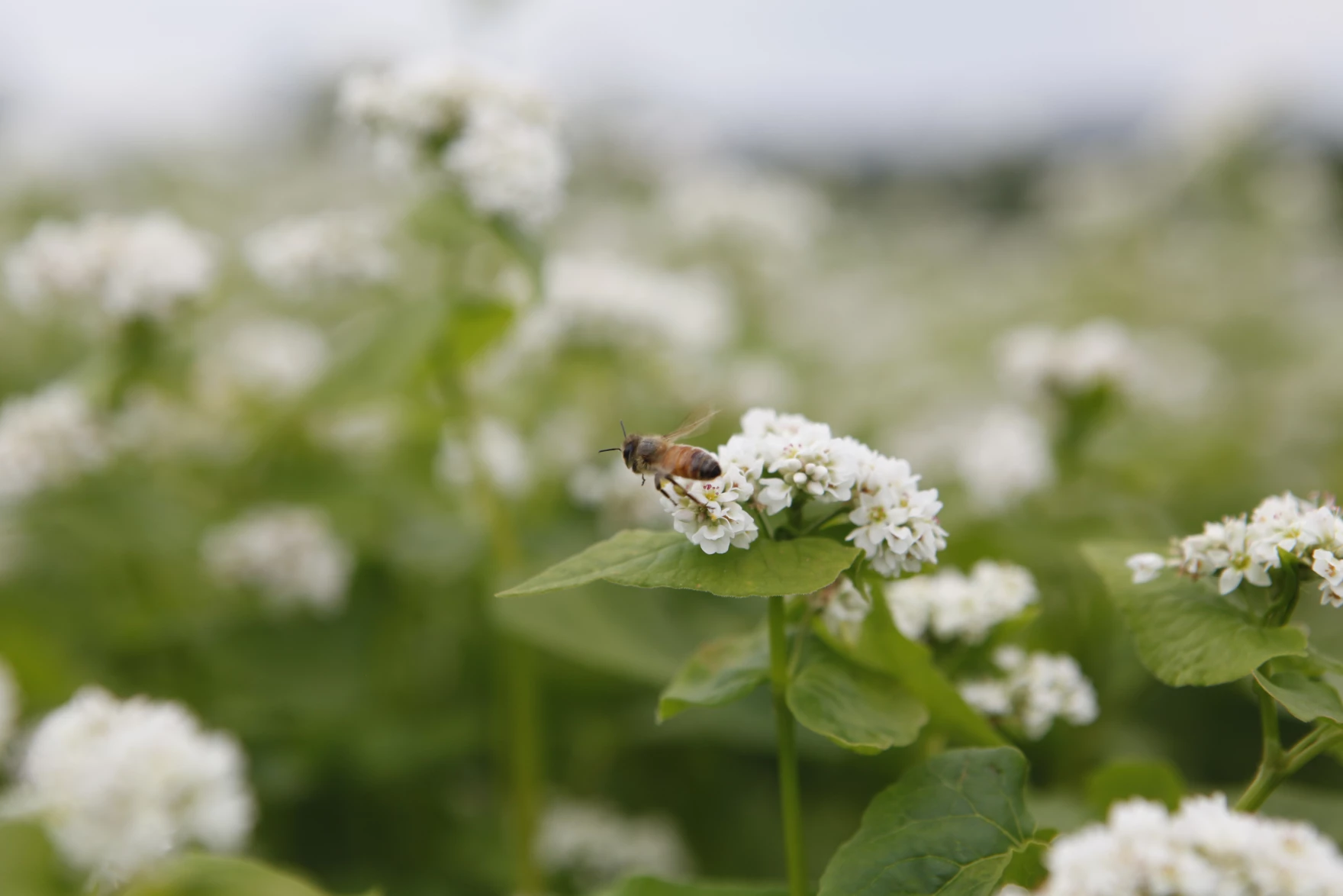
A bee feeds on the flowering buckwheat at Loma Farm. (credit: Dan Wanschura/Points North)
SPRINGER: The Colorado hailstorm was a big moment. What’s another, like, specific moment that you can remember- I don’t know that might have sent you to the calculator to figure out, ‘What does this mean?’
THEISEN: Yeah. Honestly, it feels constantly present that idea of going to the calculator and like, ‘Okay, what is the reality of this moment in time?’ … You know, I can always feel it when we’re spinning, when we’re slipping a little bit. And then it’s like a reaction. Do I have to put my sales hat on and get out and sell? Do I have to tighten the belt on labor? … Is it a time to like relax cause the numbers are looking good. And the truth is the numbers never look right. The farm works, you know, this is our 15th year with Loma. … But, yeah, the reality is that in farming numbers are tight, especially on this small scale. It’s a high-labor, low-margin profession with a lot of risks.
SPRINGER: Do you think it should be that way?
THEISEN: I don’t think it should be like that. … I am a professional. I have spent over two decades developing these skills. … And I don’t mean this to sound braggadocious, but I just think farmers are very skilled, … but we’re nowhere near other professions in terms of compensation. And the risk to reward ratio is off. And so, you know, I could compare myself to a plumber. Plumbers are making more and less vulnerable. And I could compare myself to a doctor, you know, and people would chuckle at that. ‘Well, a doctor went to school for eight or ten years.’ And I wholeheartedly believe that farming is every bit as hard as being a doctor. And the pay is nowhere near. … And again, I don’t want to emphasize the negative aspects of it. But it is … at some points it feels like we’re donating- we’re sacrificing our health as individuals for the community good. And at other times it feels like we’re the luckiest ones there are. It’s that same opposites are always present.
(sound of cart and zucchini harvest)
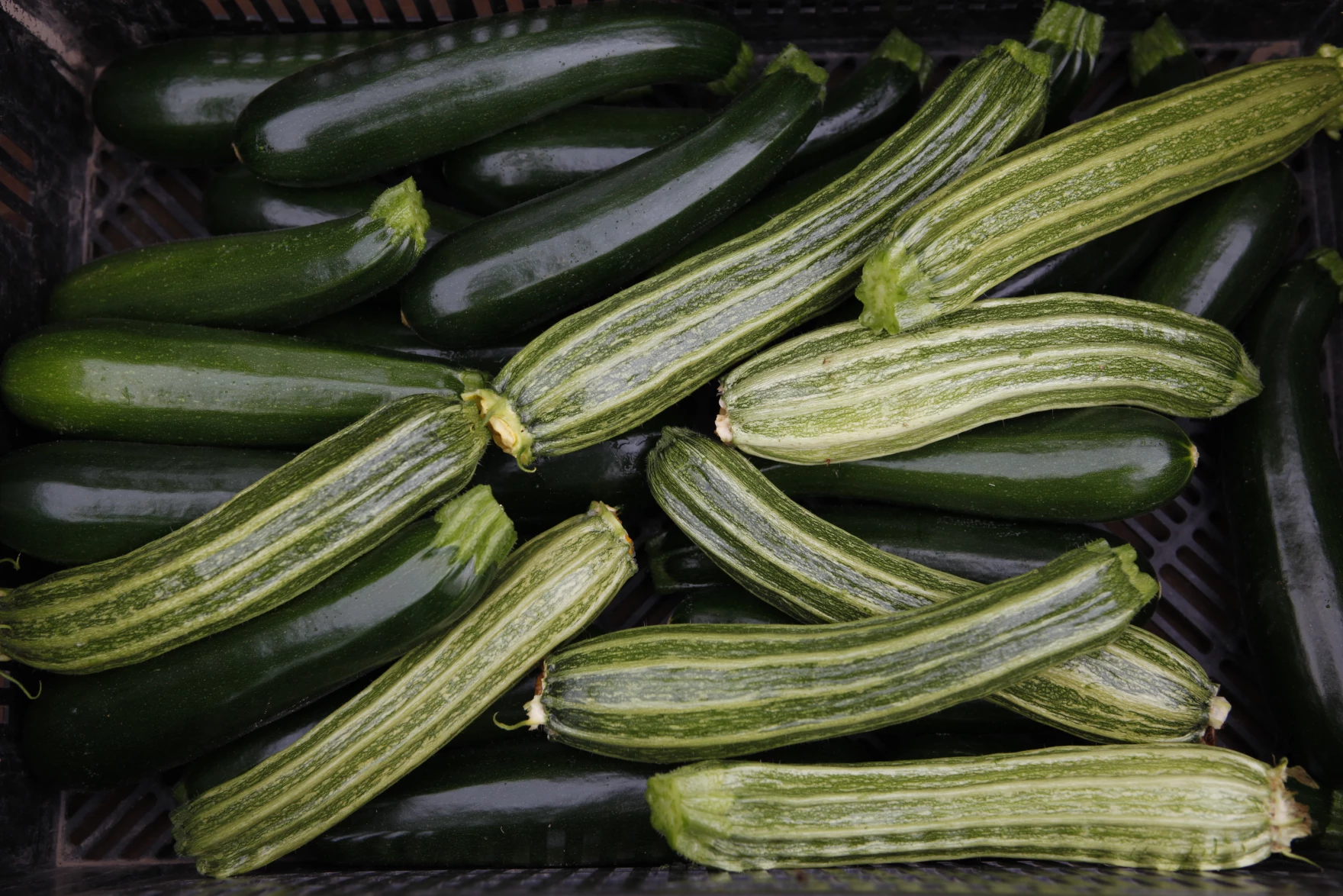
Two varieties of zucchini harvested at Loma Farm. (credit: Dan Wanschura/Points North)
SPRINGER: These days, the way to make a steady profit farming – it’s not on a small farm like Loma, it’s on a big one. A lot of that has to do with technological developments – innovations in equipment, chemicals and genetics. So instead of a lot of small farms that grow a bunch of different crops, there are more big farms that just grow a few crops. And these big farms are able to grow more food without increasing their overhead much.
(sound of zucchini harvest)
SPRINGER: You know, some people don’t care about small farms at all. You know, they’re fine to have big agriculture and go to the grocery store and get their food. Like, why does it matter that the number of farms is declining?
THEISEN: Yeah, I don’t know. I think about this all the time, and it’s so true that most people don’t care. … I wonder this sometimes, are they? Can small farms feed the world? There’s an argument that there’s no way. We need big agriculture to feed the world. I don’t know the answer to that. In my heart, I believe that small farms can feed the world, and I think could feed it better. … I think they’re important to the feel of a community. … I think the preservation of landscape, I think the preservation of open space, I think reducing food mileage, … I think it’s a part of creating a nice place to live, keeping access to healthy and flavorful and fun to eat food. Yeah, I think it’s really important.
(sounds of harvesting green beans)
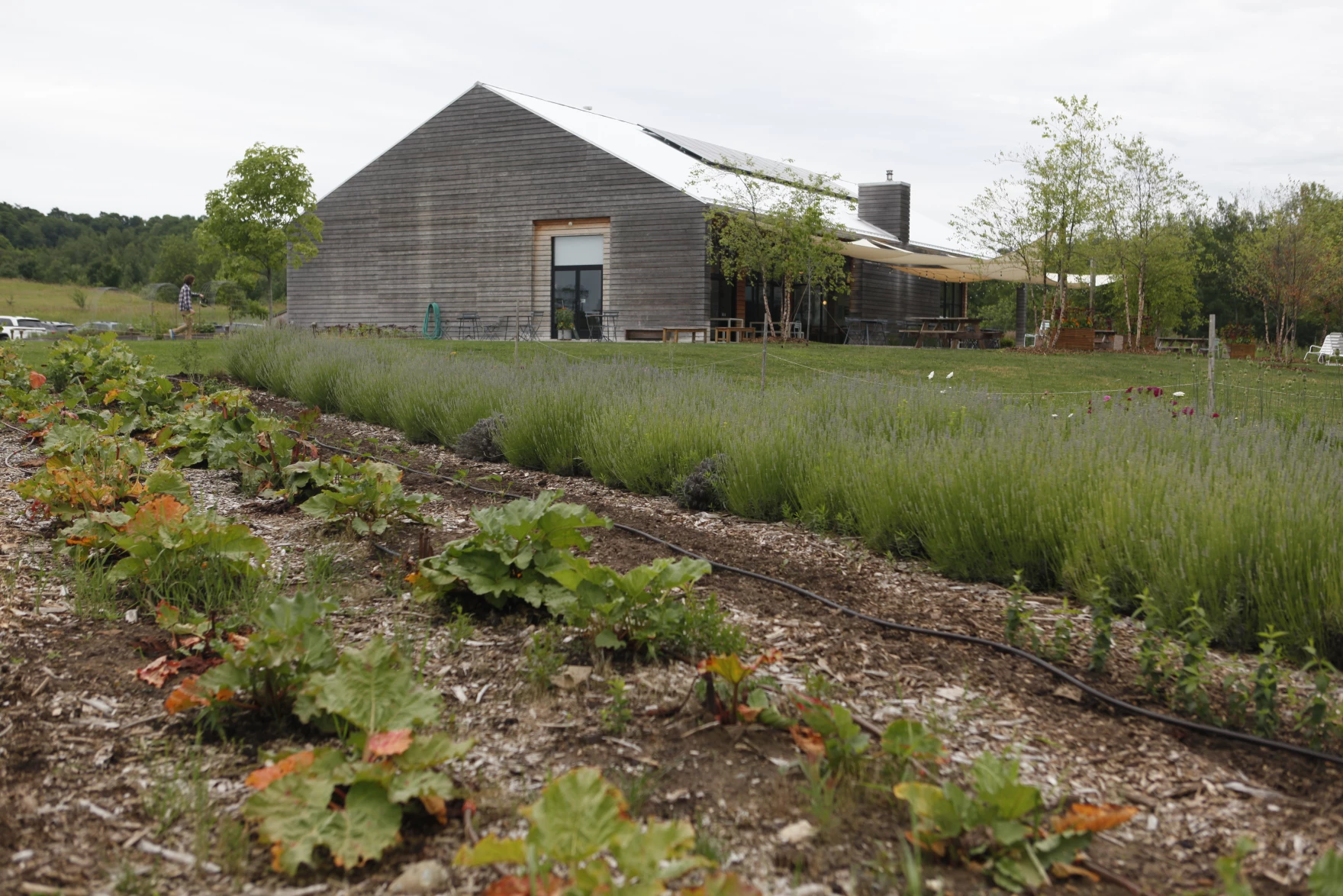
Nic Theisen co-owns Farm Club with his wife Sara and friends Allison and Gary Jonas. Ninety percent of the vegetables and herbs on the menu come from the farm on site or Loma Farm, which is about a mile down the road. (credit: Dan Wanschura/Points North)
SPRINGER: Things really changed for Nic and his wife Sara in 2020 when they started a new business with friends.
THEISEN: It just changed the whole game for us.
SPRINGER: The business is called Farm Club. It’s partially a restaurant surrounded by beautiful gardens and farmland. But Nic says, it’s really a farm first. About 90% of the vegetables and herbs on the restaurant menu- they come from the farm. They mill their grains at Farm Club, bake bread, and brew beer. And they sell vegetables at the market there.
Nic says when they started Farm Club, they didn’t know if they would succeed – even though they’re in a tourism hot spot. But really all the different ventures that make up the project are key.
THEISEN: And all of that is bringing way more money in. … And that diversity and that value add is making this project successful and not only successful, but truly thriving. And I couldn’t feel more grateful for that, especially having gone through the trenches to get here.
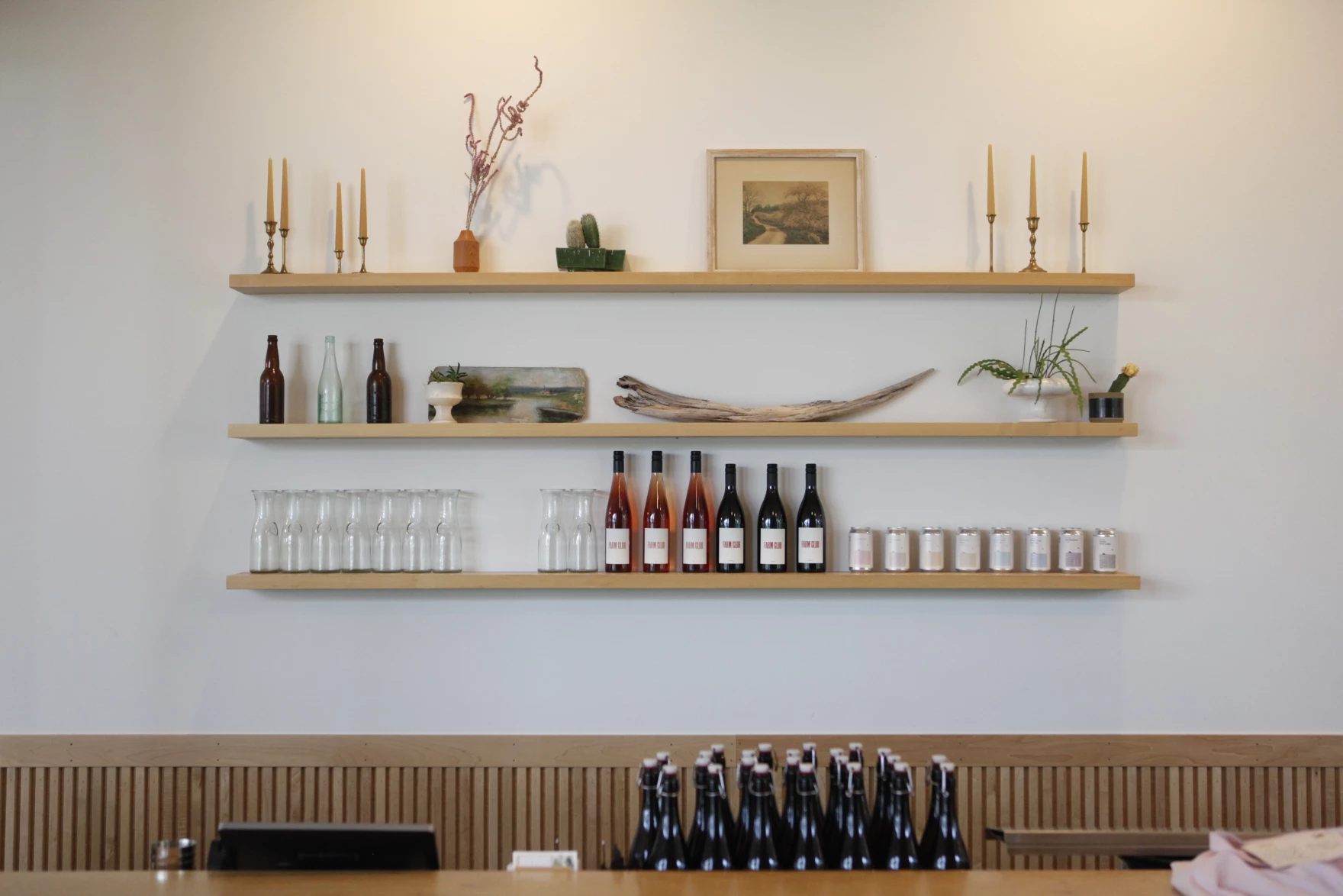
Inside the Farm Club restaurant, where they also brew beer, bake bread, mill grain and have a market. (credit: Dan Wanschura/Points North)
(sounds of the Farm Club kitchen)
SPRINGER: Okay, now we’re in the Farm Club kitchen.
SPRINGER: On the menu are things like the farm board with veggies, bread, dipping sauces, cheeses and meats. There’s tempura fried garlic scapes, arugula salad with roasted beets and pozole.
Now by just about any metric, Farm Club is a huge success. During the summer months, they hire to help the operation run. And the people come. They eat, they drink, they’re merry. And a whole bunch of articles have been written about it … including in Bon Appetit.
SPRINGER: Is there any part of you that feels sad – and I’m going to put this question in the framework of like the decline of the number of farms – but feels sad that thriving meant you couldn’t just be a farm?
THEISEN: One hundred percent. Yes. Every single day I think, ‘I do not want this farm to only exist because we have a full sail of Farm Club pulling this anchor along.’ And it doesn’t; the farm is economically viable on its own. It’s the lowest margin of any project that we’re doing out of the bakery, market, brewery, restaurant, farm. But then at the same time, it is the very engine of the entire project. It is the food. I believe it is the buzz. I believe it is why people can taste the difference … The project to me, I think is not sad. Of course. … I just love that about it. But short answer, yeah, I think it’s sad that it’s hard to make a living farming.
SPRINGER: Do you still feel those like the mixture of emotions or is it has it leveled out a little more?
THEISEN: I think it is still 100 percent a labor of mixed emotions. But I believe that most people’s lives are that way. I think you can love something and despise it at the same time. And you just want to hope that you spend more time loving it.
(sounds of the farm)
Catch more news at Great Lakes Now:
Points North: A Natural Ending
Featured image: Nic Theisen (left), co-owner of Loma Farm and Farm Club, plants brussels sprouts with employee Dexter Lamie. (credit: Dan Wanschura/Points North)


